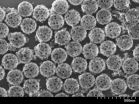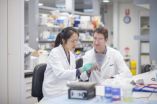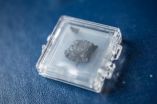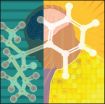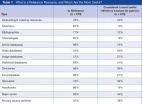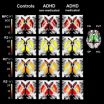(Press-News.org) Examining factors such as how much children gesture at an early age may make it possible to identify and intervene with very young children at risk for delays in speech and cognitive development, according to a new study by researchers at the University of Chicago.
The research by leading early learning scientists looked at children from a wide variety of backgrounds, including those from advantaged and disadvantaged families, and those who had suffered brain injury. Their work was published in an article, "New Evidence About Language and Cognitive Development Based on a Longitudinal Study: Hypotheses for Intervention" in the online edition of the American Psychologist. The paper offers evidence-based suggestions, which grew out of the study, for developing diagnostic tools and interventions to enhance language and cognitive development.
The authors found that although language learning varies according to family income and education levels, not all of the impacts are the same. Although parents from advantaged backgrounds spoke more with their children, there was no difference between advantaged and disadvantaged families in the quality of the word-learning experiences parents gave their children. The study found independent effects of both quantity and quality of input on word learning.
They also found that early gesture – the spontaneous gestures children produce to communicate before and as they are learning to use words – can be used to identify which children with brain injury are likely to go on to develop spoken vocabularies within the typical range, and which children are likely to continue to experience language delay. The importance of the finding is that this diagnosis can be made before language delays appear in speech, thus opening the door for earlier and more targeted interventions.
"We believe that our findings have implications for prediction and diagnosis of later language deficits and for intervention that may improve language skills," explained lead author Susan Goldin-Meadow, the Beardsley Ruml Distinguished Service Professor in Psychology at the University. Goldin-Meadow is one of the nation's leading authorities on language learning and gesture.
By videotaping samples of children's and parents' speech and gestures during interactions at home, the researchers were able to examine in what way and how often gestures were used to communicate, and whether that might help predict the child's language acquisition. The researchers also evaluated whether the parents' speech was related to the children's development of cognition and language.
Susan Levine, the Rebecca Anne Boylan Professor in Education and Society in Psychology at UChicago, was also part of the team. Levine is a specialist on early mathematics development and has done pioneering work in the study of children with brain injuries.
"We are also exploring the impact that parent speech might have on variation in children's cognitive skills. This is a long term project spanning many years that allows us to answer some questions about the natural trajectory of learning and how it's affected by variations in learners and their environment," said Levine.
Two groups of children were observed in this study over four years. The first group included 64 families with children ranging from 14 months to nearly five years old without known physical or cognitive disabilities. Those children were assumed to be typical learners. The families represented a variety of ethnic/racial makeups and family income levels. The second group included 40 families with a child who had suffered a unilateral brain injury before or around the time of their birth.
The researchers videotaped interactions between the child and their primary caregiver (usually the mother) at home during ordinary daily activities for 90-minutes every four months for a total of 12 visits. The interactions were then transcribed for the analysis of all child and parent speech and gestures.
From that analysis, the researchers were able to develop four hypotheses on language and cognitive development:
Charting early gesture has the potential to serve as a diagnostic tool to identify children at risk for language delay.
Encouraging children to gesture at very early ages has the potential to increase the size of their spoken vocabularies at school entry.
Encouraging caregivers to use more diversified vocabulary and complex syntax has the potential to facilitate children's acquisition of vocabulary and complex syntax.
Encouraging caregivers to increase their use of words for number, for the spatial properties of objects, and for abstract relations like similarity has the potential for improving children's understanding of number and spatial thinking, and their ability to make sophisticated comparisons.
"We wanted to examine the influence of both environment and the learner on language, so we included children from a wide socio-economic range to look at variation in learning environments, and children with early brain injuries to study variation in learners," said Goldin-Meadow. "We found that the amount and type of input children with brain injury receive from their parents or caregivers plays an even bigger role in syntactic and narrative development (but not vocabulary development) than it does in children without injury," said Levine.
Goldin-Meadow and colleagues said follow-up studies are needed to determine ways to increase the talk that children hear to enhance their language and thinking skills. They are hoping that the insights gained from this study and the follow-up studies can be used as a basis for developing educational materials such as videos, computer games and curricula for preschools.
INFORMATION:
Co-authors on the study include Janellen Huttenlocher, the William S. Gray Professor Emeritus in Psychology, who is one of the nation's leading researchers in early language development. Also on the team were Stephen W. Raudenbush, the Lewis-Sebring Distinguished Service Professor in Sociology, Steven L. Small, Professor Emeritus, Departments of Neurology and Psychology, and Larry V. Hedges from NORC at the University of Chicago and a Professor of Psychology at Northwestern University.
Long-term study suggests ways to help children learn language and develop cognitive skills
2014-06-17
ELSE PRESS RELEASES FROM THIS DATE:
Nanoshell shields foreign enzymes used to starve cancer cells from immune system
2014-06-17
Nanoengineers at the University of California, San Diego have developed a nanoshell to protect foreign enzymes used to starve cancer cells as part of chemotherapy. Their work is featured on the June 2014 cover of the journal Nano Letters.
Enzymes are naturally smart machines that are responsible for many complex functions and chemical reactions in biology. However, despite their huge potential, their use in medicine has been limited by the immune system, which is designed to attack foreign intruders. For example, doctors have long relied on an enzyme called asparaginase ...
Gene 'switch' reverses cancer in common childhood leukaemia
2014-06-17
Melbourne researchers have shown a type of leukaemia can be successfully 'reversed' by coaxing the cancer cells back into normal development.
The discovery was made using a model of B-progenitor acute lymphoblastic leukaemia (B-ALL), the most common cancer affecting children.
Researchers from the Walter and Eliza Hall Institute showed that switching off a gene called Pax5 could cause cancer in a model of B-ALL, while restoring its function could 'cure' the disease.
Institute researchers Dr Ross Dickins and Ms Grace Liu led the study with institute colleagues and ...
E-cigs heavily marketed on Twitter, study finds
2014-06-17
E-cigarettes, also known as vaping pens or e-hookas, are commonly advertised on Twitter and the tweets often link to commercial websites promoting e-cig use, according to University of Illinois at Chicago researchers.
The study, published as a special supplement in the July 2014 issue of Tobacco Control released online June 16, has implications for future FDA regulations on the marketing of e-cigarettes and related products.
"There's this whole wild west of social media platforms – Facebook, Twitter and Instagram – and the FDA has no way to track what's happening in ...
Soft-drink tax worth its weight in lost kilos
2014-06-17
A tax on sweetened soft drinks could be an effective weapon in the war against obesity, generating weight losses of up to 3.64 kilograms as individuals reduce their consumption.
Researchers from Monash University, Imperial College London and University of York and Lancaster University, England have estimated the extent to which drinking habits would change if beverages such as carbonated non-diet soft drinks; cordials and fruit drinks were taxed.
Lead author Dr Anurag Sharma, of the Centre for Health Economics at Monash University, said such a tax could have important ...
Solar photons drive water off the moon
2014-06-17
Water is thought to be embedded in the moon's rocks or, if cold enough, "stuck" on their surfaces. It's predominantly found at the poles. But scientists probably won't find it intact on the sunlit side.
New research at the Georgia Institute of Technology indicates that ultraviolet photons emitted by the sun likely cause H2O molecules to either quickly desorb or break apart. The fragments of water may remain on the lunar surface, but the presence of useful amounts of water on the sunward side is not likely.
The Georgia Tech team built an ultra-high vacuum system that ...
Researchers identify new compound to treat depression
2014-06-17
There is new hope for people suffering from depression. Researchers have identified a compound, hydroxynorketamine (HNK), that may treat symptoms of depression just as effectively and rapidly as ketamine, without the unwanted side effects associated with the psychoactive drug, according to a study in the July issue of Anesthesiology, the official medical journal of the American Society of Anesthesiologists® (ASA®). Interestingly, use of HNK may also serve as a future therapeutic approach for treating neurodegenerative disorders such as Alzheimer's and Parkinson's diseases, ...
Surgical patients more likely to follow medication instructions
2014-06-17
A study in the July issue of Anesthesiology revealed that patients who receive a simple, multicolor, standardized medication instruction sheet before surgery are more likely to comply with their physician's instructions and experience a significantly shorter post-op stay in recovery. These findings are important because surgical patients often fail to follow their doctor's medication instructions for preexisting conditions such as diabetes and hypertension on the day they are having surgery – a costly mistake that can lead to surgery cancellation, complications and longer ...
References resources find their place among open access and Google, study finds
2014-06-17
Los Angeles, CA (June 17, 2014) How do open access sources, tightened budgets, and competition from popular technologies affect how librarians perceive and employ reference resources? How do librarians expect to utilize reference in the future? "The State of Reference Collections," a new SAGE white paper out today, finds that though the definition of reference is changing, this is in part because reference resources now look and feel like other information sources and because other information resources perform the traditional purpose of reference – answering research ...
Study links APC gene to learning and autistic-like disabilities
2014-06-17
BOSTON (June 17, 2014, 4:00 a.m. EDT) — Autistic-like behaviors and decreased cognitive ability may be associated with disruption of the function of the Adenomatous Polyposis Coli (APC) gene. When Tufts researchers deleted the gene from select neurons in the developing mouse brain, the mice showed reduced social behavior, increased repetitive behavior, and impaired learning and memory formation, similar to behaviors seen in individuals with autism and intellectual disabilities. This study is the first to evaluate how the loss of APC from nerve cells in the forebrain affects ...
MRI technique may help prevent ADHD misdiagnosis
2014-06-17
OAK BROOK, Ill. – Brain iron levels offer a potential biomarker in the diagnosis of attention deficit hyperactivity disorder (ADHD) and may help physicians and parents make better informed treatment decisions, according to new research published online in the journal Radiology.
ADHD is a common disorder in children and adolescents that can continue into adulthood. Symptoms include hyperactivity and difficulty staying focused, paying attention and controlling behavior. The American Psychiatric Association reports that ADHD affects 3 to 7 percent of school-age children.
Psychostimulant ...
